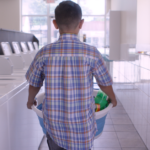






I’m Failing Forward As a Parent and Teacher, and I’m Okay with That
I was a straight-A student. I was the girl who always did my homework, always broke the curve, always went above and beyond. As my fellow overachievers can attest, you don’t outgrow that. When that behavior is rewarded (and don’t get me wrong, hard work and motivation deserve to be rewarded), we internalize that desire to do everything right. Failing forward doesn’t really come up much because we don’t really fail.
I’m now a seventh grade teacher at a school for refugee and immigrant children, and my desire to do things to the best of my ability has intensified, if anything. The stakes are much higher now. Instead of just maintaining my own star-student reputation, I’m in charge of the physical and mental and emotional well-being of 92 kids who are often in crisis or experiencing trauma. This is my 16th year teaching, and I’m good at it. My kids enjoy my class, and they grow as readers and writers.
I also have two kids of my own, a fourth grader and a three-year-old. Parenting’s tough for a perfectionist, because it’s impossible to actually do it right. You make a million split-second decisions an hour, and there’s just no way to nail it on all of them. No, you can’t have a cookie. Right now it’s play-by-yourself time. Okay, one more book. Yes, we’ll buy the glitter glue. No, no more snacks. But in the parts of parenting that are quantifiable, like limiting screen time and finishing homework, I’m still trying to get the gold star.
As a veteran overachiever, I’m not very good at failing. I’m afraid of getting it wrong, not because I worry so much about other people’s response, but because doing things right is such a part of my identity.
Online teaching has completely disrupted my need to succeed.
I’m a Luddite. I feel like this is something I should admit only in a closed room with a support group of other teachers, but … I’ve never made a Kahoot! before. I barely know how to navigate Google classroom. I deleted myself from the staff email group by accident, lost access to all my lesson plans, blamed my assistant principal, and forced our tech guy to spend half an hour on the phone with Google uncovering the roots of my incompetence. Now that we’re doing 100% virtual learning, I’m becoming close friends with failure, and it’s had a huge impact on my parenting.
Things are stretched thin at our house. My husband and I are incredibly fortunate to be able to work from home, and his mother is usually able to keep our kids two days a week. But three days a week, sometimes more, we have two full-time jobs and two kids—one of whom is attempting online school and one of whom believes that all the world’s a stage and she needs a perpetually-available audience. There is not enough time and energy to go around. Failing forward has become a requirement. Teachers even want kids to fail sometimes.
Last week, our Wi-Fi was shaky, and my son’s Zoom meeting got glitchy. I went up to troubleshoot, which is a joke, because Wi-Fi is a mystery to me on the same level as alchemy. I realized that he was one of only three kids in his class who was working in his room alone. Every other kid had a parent, sometimes two, onscreen and actively participating in the class.
Fourth grade seems to have become a job that requires an entire committee. Division worksheets are now a cottage industry.
Thank goodness I had some recent experience with imperfection. In fact, just the day before, I’d accidentally kicked myself out of my own class meeting, then delivered multiple minutes of instructions while on mute. Then I used some mild profanity when my dog started barking at the Amazon van.
This experience reminded me that, even when I’m not functioning perfectly, the world doesn’t come to a stop. There is plenty of room for imperfection, and not only are people not horrified if I make mistakes, they’re positively delighted. (It doesn’t hurt that those people are 12 years old and still titillated by the word “damn.”) I took a deep breath and did the one thing I knew how to do to fix my son’s computer: I turned it off, said a couple of cuss words, and turned it back on.
Long story short, he got kicked out of the meeting, his teacher didn’t know how to let him back in (I knew I liked her), and now he’ll probably never know the difference between theme and moral.
My son has inherited my fear of failure, and online school has been hard on him.
As he looked at his homework later that night, he realized that he didn’t understand the instructions for the worksheet. He got upset and worried because he wouldn’t be able to finish his homework before the next day’s class. He asked my husband and me to help him. Why are the instructions so confusing? Rather than spend thirty minutes Googling and trying to discern what kind of answer the questions required, I shrugged and said, “I have no idea. Send your teacher a message and tell her you didn’t understand it.”
That’s right. I didn’t help my kid with his homework. And I didn’t even email his teacher to explain that he didn’t understand it. I just threw that all on him and went back to making lesson plans while the preschooler was … well, I’m not sure what she was doing, actually. Advanced chemistry? Poking roadkill with a stick? Whatever. It was a great failing-forward moment.
I still had a little anxiety before his class the next day. Would his teacher—or the nineteen parents who were apparently retaking the fourth grade—judge me for not working tirelessly to complete the assignment with him? Nope. Only, like, half those kids had finished it, and I think most of them had done it wrong. It was fine. The teacher went over it, they did it in class, my kid finished a few minutes early, and we took the dog for a walk.
When everything is unfamiliar, failure—and failing forward—is something to be expected, not avoided.
Nobody is expecting my son to be a master of online learning. How could he be? It’s brand new. Nobody is expecting me to be a pro, either. In fact, everyone is figuring it out as we go along. We’re all failing forward. And we’re giving each other a lot more room for error.
During the three weeks we’ve been in school, I’ve found myself opening a lot of activities by saying, “We’re going to try this thing, and I have no idea if it’ll work or not. I want us to figure it out so we can use it for real assignments later.” Then we play around with technology and see what works and what’s a disaster.
The more I approach tasks with the expectation that we’ll get it wrong the first time, the more I realize the insanity of expecting to get it right.
This is especially true with kids. Of course my elementary schooler is confused by his homework—he’s learning this for the first time! Learning what you don’t know and what you need to work on is a huge part of education. The same is true for my seventh graders. I can explain an assignment flawlessly. I can put the instructions in writing, offer a video, and show them how to do it on Zoom, and they’ll still do it wrong. I’m trying to handle these breakdowns the same way I handle glitchy Internet and bugs in the apps. We figure out where the problem is and address it. “Oh, you didn’t realize that this assignment was for a grade, so you did it in ten minutes instead of taking your time, like I said to? Okay, well, now we know that that won’t work. Do you know what to do differently next time? Great!”
My son and I are both learning an entirely new way to “do” school. It’s not easy, and there have been plenty of meltdowns. But if it comes with a new attitude toward learning and failing forward, I think it will be worth it.



Add your comment now using your favorite social account or login to your LetGrow account.